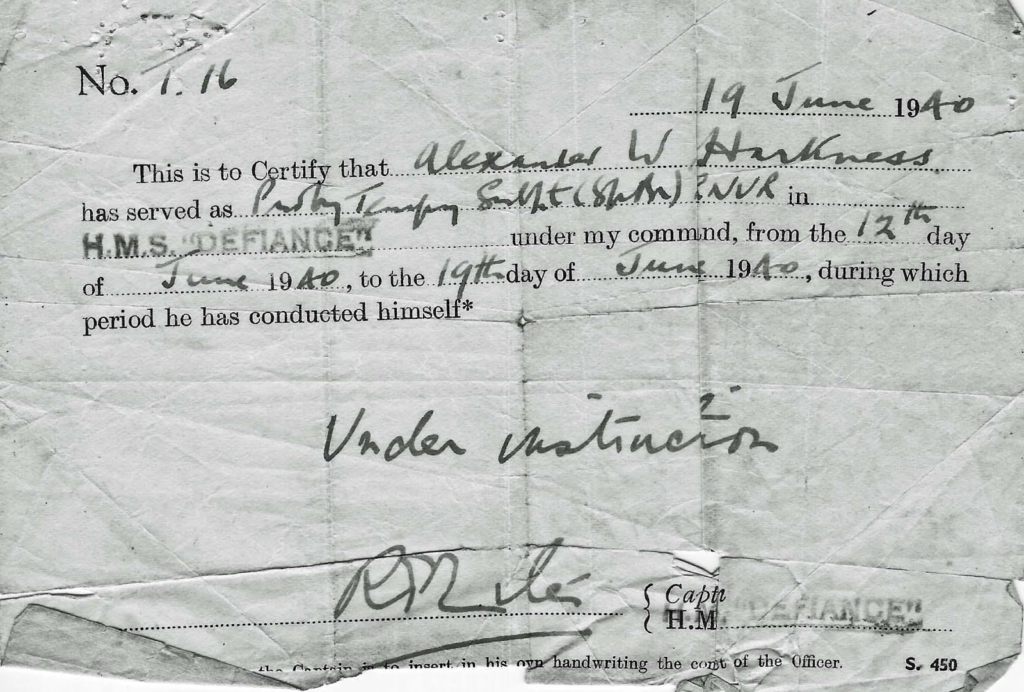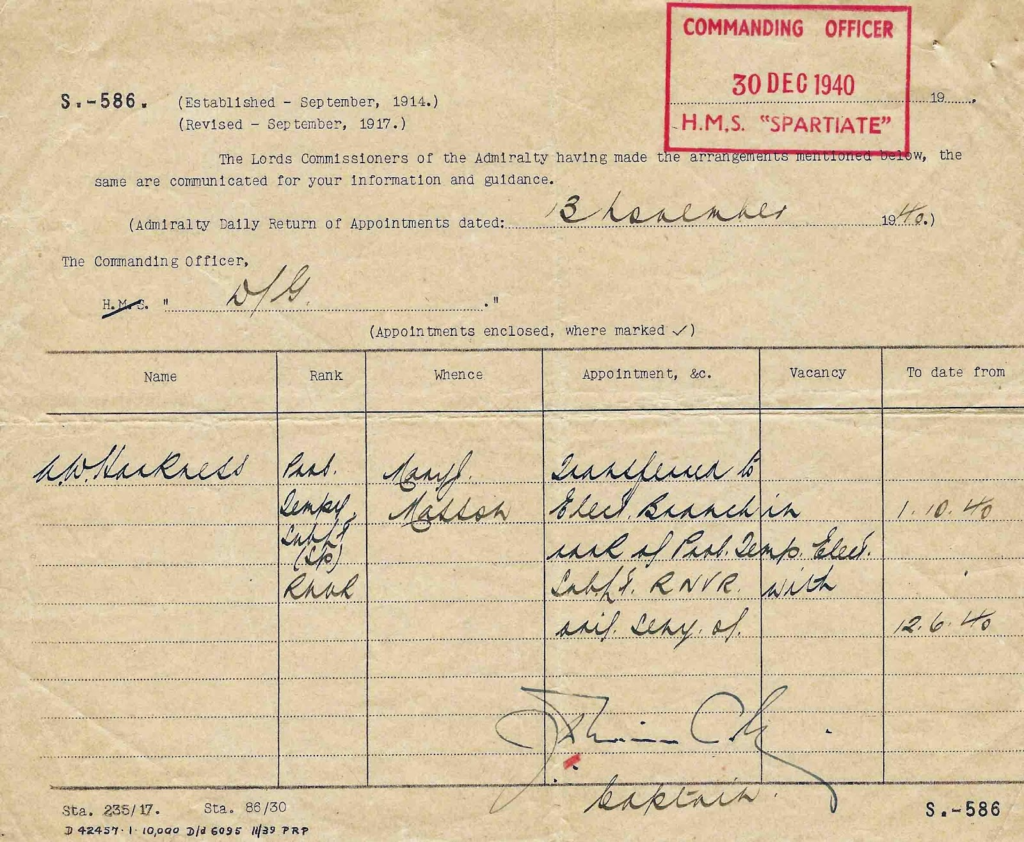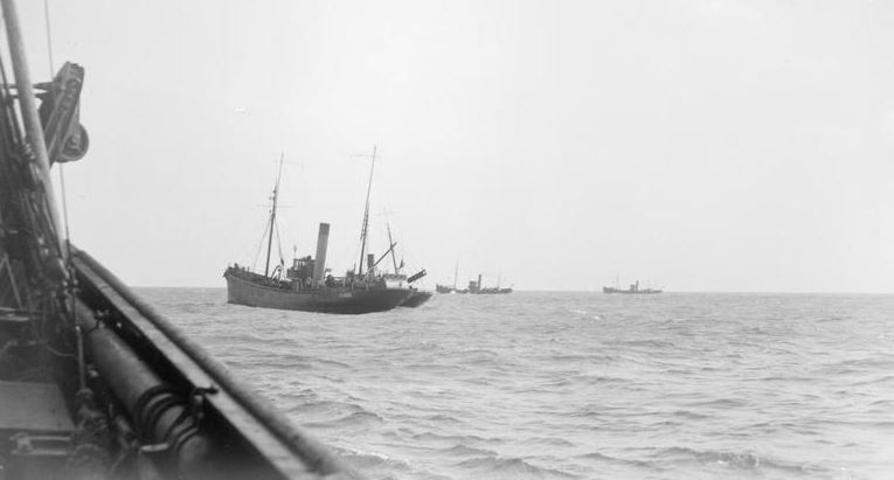In this section, I will attempt to interpret all of my father’s documents and career certificates during his time at the Royal Navy Volunteer Reserve (RNVR) from 12 June 1940 to 12 July 1946. However, this is not a case of ‘deep’ research. Hopefully, other friends and relatives can add to or rectify these cursory interpretations when I post them on an interactive website.
My father enlisted in the Royal Naval Volunteer Reserve (RNVR) in June 1940, about nine months after the war began in 1939. You can read more about the possible reasons behind his enlistment here.
His date of enlistment is shown in various H.M.S. certificates you will later see below. It appears that rearmament provided jobs for people, not just soldiers. In other words, my father was a ‘civilian’ employed by the Royal Navy at H.M. Dockyard, Rosyth.
My father also has numerous career certificates from his time working at the RNVR. Many of these were of short duration; he had specific degaussing tasks he had to finish, and then he would move on to the next task. I will discuss each of these tasks in this post and in the succeeding ones. I will begin with his work as an Electrical Lieutenant briefly, to his training, and then focus on the HMS Spartiate testimonial, where his naval career seems to have begun.
Elec. Lieutenant in Charge of Electrical Plant
After the CV item regarding his work at H.M. Dockyard, Rosyth, the next item is very brief and just states: “1940-1946: Elect. Lieutenant in charge of the electrical plant and equipment used for degaussing.”
Training at H.M.S Defiance

The certificate shows my father served in the HMS Defiance, Devonport, Plymouth from 12 June 1940 to 19 June 1940. The establishment is made up of three old ships.28 HMS Defiance appears to be a training ship. This is understandable given that my father had just enlisted in the RNVR on 12 June 1940. More research is required as there seems to be a lot of military information on the Internet, but it is difficult to sort through.
H.M.S. Spartiate

My father was working at a land-based naval facility, H.M.S. Spartiate. He has a testimonial dated 30 December 1940. It gives the dates 12 June 1940 and 1 October 1940.
Because of the H.M.S prefix, I assumed this was a ship at first. It was, however, not a ship. During WWII, H.M.S. Spartiate was “responsible for security and safety on the River Clyde” from Port Glasgow, along the dredged channel, to the limit of navigation in Glasgow.29 While the headquarters was based at the St. Enoch Hotel, Glasgow, the patrols were based along the river; this may account for reports that place HMS Spartiate in locations other than Glasgow.
My Father as James Bond
As mentioned, the headquarters was at the St. Enoch Hotel. I think my father blew a golden opportunity here because it had the so-called ‘James Bond’ pretensions:
“The Royal Navy requisitioned most of the St Enoch Hotel. Room 504 became the hub of the Clyde intelligence system. It was emptied and refurnished as an office, including a safe and camp bed, and its most important asset, a scrambler telephone with a direct line to the Admiralty in London.”
Despite his interest in security, I don’t believe my father was a latter-day ‘James Bond’. But he might have been aware of it, even if he didn’t say anything about it. As far as I can tell, he was concerned with the more practical aspects of security, such as degaussing boats and ships. More importantly, he was working at the St. Enoch Hotel and billeted at the Highlanders’ Institute, where my mother also worked.31
One wonders why my mother’s papers didn’t include a letter of recommendation from the Highlander’s Institute. Maybe her ‘career’ was to be a housewife, and she didn’t need a recommendation. All of these locations were in or near Glasgow’s ‘Merchant City’, and my mother also lived in this central urban area, on Scotia Street.
My Father as a Spartan
I hadn’t imagined my father to be a ‘Spartan’ and I’m not sure if he was aware of this either. Or, more precisely, a Spartiate:
“A Spartiate was a male of Sparta with full citizenship, and the Spartiates were the elite warrior class of the rigidly hierarchical Spartan society. Use of the name by the Royal Navy dates back to the capture of a French vessel, originally Sparti. This was a 74 gun third rate ship of the line captured from the French at the Battle of the Nile (1798), which then fought at the Battle of Trafalgar (1805) for the British. Captured ships were invariably pressed into service by their captors, and since sailors were generally superstitious, the name was retained. Naval tradition dictated that once a ship had been captured so too was the name, which would then be reused on new ships or shore establishments.
The thing is, I never heard my mother or father mention the word Spartiate, nor the glorious past of its name before. I think this was another missed opportunity for my father. He loved to brag about his Spanish aristocratic ancestry. When he was in his cups, he often mentioned that his old relatives were from the Orkneys. I haven’t done extensive research on this, but some internet searches will show connections between the Reids of Orkney and the Spanish Armada.32
As I mentioned, since I started studying our family’s history, I have developed a greater appreciation for oral sources. In other words, my father’s drunken ‘bletherings’ were more than just that. William Harkness married Jane Reid in 1833. But as mentioned, there are other branches of my father’s family that descend from the Shetlands and the Orkneys, so it might not be the Reids. This is something that should be looked further into. I also have some photographs of his old Orkney relatives, but I have not been able to identify them yet.
Alexander the Great, King of Sparta, and ‘Rhoda of Troy’
If we consider my mother Rhoda to be a modern-day ‘Helen of Troy’, then my father, ‘Menelaus’, King of Sparta, sailed up the warm and friendly Clyde in his noble ship, ‘Girl Ethel’, to ‘rescue’ Rhoda, from her ‘enslavement’ in the ‘Highlander’s Institute’. I have to apologise to the reader for this ‘strained analogy’, but I just couldn’t help myself. My father was a Spartiate who sailed up the Clyde in ‘Girl Ethel’, in order to meet one of the world’s most beautiful women, not Helen, but my mother!
Rhoda is a Greek name that means ‘rose.’ It is related to the fact that the Greek island of Rhodos was named after its roses. My father is named after Alexander the Great of ancient Greece, one of history’s greatest and most successful military commanders. In other words, there were simply too many similarities to ignore. I wanted to elaborate further on the analogy, but after reading a little about the Greek myth of ‘Helen of Troy’33 and the ‘Trojan War’,34 I quickly gave up on this endeavour. Any student of mythology will tell you that these stories are like tangled Gordian knots,35 and difficult to untie.
The Missing Link
I was initially confused by how my father was stationed in the Holy Loch as the ‘captain’ of ‘Girl Ethel’, which was quite a distance away from his headquarters in Glasgow. But through the help of the HMS Spartiate testimonial, we can say that the missing piece of the jigsaw puzzle of how my parents met has finally been found.
My father was most likely residing in both Glasgow and the Holy Loch during this time. He was probably billeted at the Highlander’s Institute (where my mother worked) when he was in Glasgow for short periods; when he was at the Holy Loch, he would sleep in one of his boats/ships with the other crew. Logically, his boat/ship ‘Girl Ethel’ would not just stay in dock at the Holy Loch but would patrol the Clyde and docks in Glasgow near the HMS Spartiate headquarters. Hence, the ‘imaginative’ scenario proposed above of my father sailing in his ship to Glasgow to meet my mother is also not that unlikely, as patrolling the Clyde was part of his job.
Thank you Herr Hitler!
So the war was what brought them together! To put it another way, if Herr Hitler had not invaded Poland in 1939, I wouldn’t have been born ten years later, and I would not be writing this story. So, I thank you, Adolf, for creating my existence in the world! In retrospect, Adolf was the unintended creator of many marriage ‘blisses’ in Britain, as marriages spiked during the war.
28 https://www.iwm.org.uk/collections/item/object/205135191 Read: 14 August 2022.
29 https://www.secretscotland.org.uk/index.php/Secrets/HMSSpartiate Read: 10 August 2022.
30 Ibid.
31 I have no evidence that he was billeted at the Highlanders’ Institute, but have assumed this, because this is where he met my mother.
32 https://www.history.co.uk/article/the-westray-dons-and-the-spanish-armada Read: 10 August 2022.
33 https://en.wikipedia.org/wiki/Helen_of_Troy
34 https://en.wikipedia.org/wiki/Trojan_War#Odysseus_and_Achilles
35 https://en.wikipedia.org/wiki/Gordian_Knot



